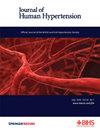Association of ambient temperature and blood pressure in the Jackson Heart Study
IF 3.4
4区 医学
Q2 PERIPHERAL VASCULAR DISEASE
引用次数: 0
Abstract
Extreme temperature events related to climate change may impact blood pressure (BP). African American populations are disproportionately affected by temperature extremes due to structural inequities. We examined the association between ambient outdoor temperature and BP among participants in JHS, a cohort of African American adults residing in the tri-county area of Jackson, Mississippi. Our primary hypothesis is that daily higher outdoor ambient temperatures would be associated with lower BP. We used a linear-mixed effects model to determine the relationship between temperature and systolic and diastolic blood pressure (SBP and DBP) at three visits (N = 5296). Participants had BP readings across three visits: Visit 1 (2000–2004), Visit 2 (2005–2008), Visit 3 (2009–2013). Cardiovascular disease (CVD), diabetes, BP medication, sex, age, and visit number were included as adjustment variables. For every 1-degree Celsius higher average temperature from the mean, SBP was 0.11 mm Hg lower (95% CI: −0.14, −0.07, p < 0.001) in adjusted models. Similarly, for every 1-degree Celsius higher average temperature from the mean, DBP was 0.06 mm Hg lower (95% CI: −0.08, −0.04) in adjusted models. The associations were weakly curvilinear (inverted U-shape) with significant quadratic terms. This relationship was not modified by markers of socioeconomic status. This is the first study in the Jackson Heart Study (JHS) to investigate the association between temperature and blood pressure. Further research is needed to explore this relationship in vulnerable populations living in areas prone to extreme temperatures.

杰克逊心脏研究中环境温度和血压的关系。
与气候变化相关的极端温度事件可能影响血压(BP)。由于结构性不平等,非洲裔美国人受到极端温度的影响不成比例。我们研究了JHS参与者中室外环境温度和血压之间的关系,JHS是一个居住在密西西比州杰克逊三县地区的非裔美国成年人队列。我们的主要假设是,每天较高的室外环境温度与较低的血压有关。我们使用线性混合效应模型来确定三次就诊时温度与收缩压和舒张压(SBP和DBP)之间的关系(N = 5296)。参与者在三次访问中有血压读数:访问1(2000-2004),访问2(2005-2008),访问3(2009-2013)。调整变量包括心血管疾病(CVD)、糖尿病、降压药物、性别、年龄和就诊次数。平均温度每比平均值高1摄氏度,收缩压降低0.11毫米汞柱(95% CI: -0.14, -0.07, p
本文章由计算机程序翻译,如有差异,请以英文原文为准。
求助全文
约1分钟内获得全文
求助全文
来源期刊

Journal of Human Hypertension
医学-外周血管病
CiteScore
5.20
自引率
3.70%
发文量
126
审稿时长
6-12 weeks
期刊介绍:
Journal of Human Hypertension is published monthly and is of interest to health care professionals who deal with hypertension (specialists, internists, primary care physicians) and public health workers. We believe that our patients benefit from robust scientific data that are based on well conducted clinical trials. We also believe that basic sciences are the foundations on which we build our knowledge of clinical conditions and their management. Towards this end, although we are primarily a clinical based journal, we also welcome suitable basic sciences studies that promote our understanding of human hypertension.
The journal aims to perform the dual role of increasing knowledge in the field of high blood pressure as well as improving the standard of care of patients. The editors will consider for publication all suitable papers dealing directly or indirectly with clinical aspects of hypertension, including but not limited to epidemiology, pathophysiology, therapeutics and basic sciences involving human subjects or tissues. We also consider papers from all specialties such as ophthalmology, cardiology, nephrology, obstetrics and stroke medicine that deal with the various aspects of hypertension and its complications.
 求助内容:
求助内容: 应助结果提醒方式:
应助结果提醒方式:


